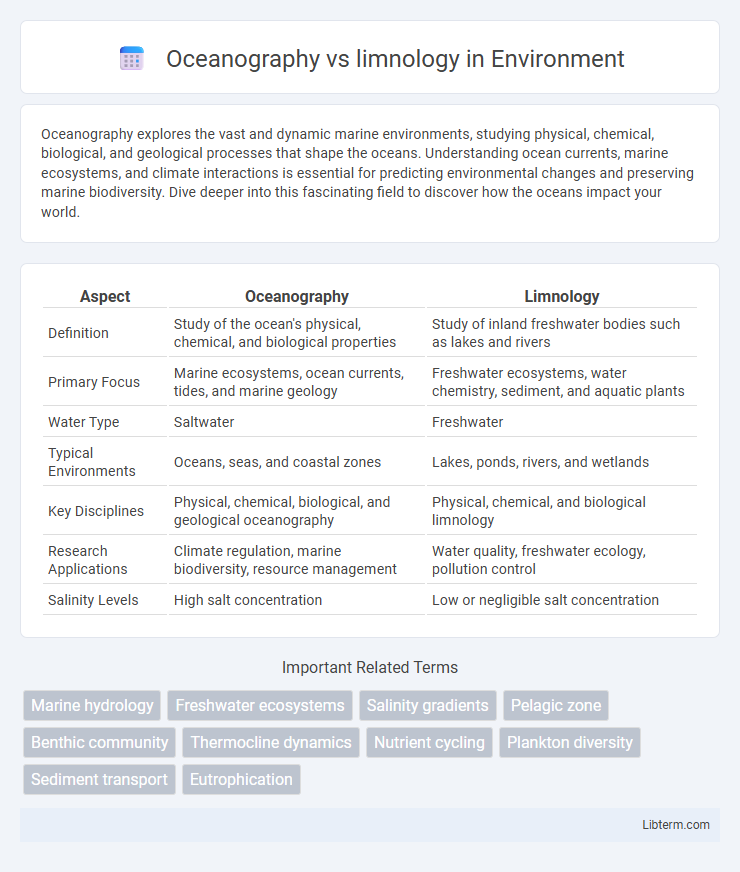Oceanography explores the vast and dynamic marine environments, studying physical, chemical, biological, and geological processes that shape the oceans. Understanding ocean currents, marine ecosystems, and climate interactions is essential for predicting environmental changes and preserving marine biodiversity. Dive deeper into this fascinating field to discover how the oceans impact your world.
Table of Comparison
| Aspect | Oceanography | Limnology |
|---|---|---|
| Definition | Study of the ocean's physical, chemical, and biological properties | Study of inland freshwater bodies such as lakes and rivers |
| Primary Focus | Marine ecosystems, ocean currents, tides, and marine geology | Freshwater ecosystems, water chemistry, sediment, and aquatic plants |
| Water Type | Saltwater | Freshwater |
| Typical Environments | Oceans, seas, and coastal zones | Lakes, ponds, rivers, and wetlands |
| Key Disciplines | Physical, chemical, biological, and geological oceanography | Physical, chemical, and biological limnology |
| Research Applications | Climate regulation, marine biodiversity, resource management | Water quality, freshwater ecology, pollution control |
| Salinity Levels | High salt concentration | Low or negligible salt concentration |
Introduction to Oceanography and Limnology
Oceanography studies the vast marine environments, including oceans' physical, chemical, biological, and geological aspects, while limnology focuses on inland freshwater bodies such as lakes, rivers, and wetlands. Introduction to Oceanography covers ocean currents, marine ecosystems, and ocean-atmosphere interactions, whereas Introduction to Limnology emphasizes freshwater ecology, water chemistry, and aquatic life in freshwater systems. Both disciplines utilize interdisciplinary approaches but differ fundamentally in the scale and type of water bodies studied.
Key Definitions: Oceanography vs Limnology
Oceanography is the scientific study of the ocean's physical, chemical, biological, and geological properties, covering marine ecosystems, ocean currents, and seabed geology. Limnology focuses specifically on inland aquatic systems such as lakes, rivers, and wetlands, examining freshwater ecosystems, water chemistry, and aquatic life. Both fields contribute to understanding aquatic environments but differ by their focus on marine versus freshwater bodies.
Major Areas of Study in Oceanography
Oceanography primarily explores the biology, chemistry, geology, and physics of the ocean, examining marine ecosystems, ocean currents, seabed morphology, and chemical composition of seawater. It studies marine organisms' interactions and adaptations, the impact of ocean circulation on climate, and sediment processes on the ocean floor. Unlike limnology, which focuses on freshwater bodies like lakes and rivers, oceanography encompasses vast saltwater environments, delving into ocean-atmosphere interactions and global climate systems.
Main Focus Areas of Limnology
Limnology primarily investigates inland aquatic ecosystems such as lakes, rivers, and wetlands, focusing on physical, chemical, and biological processes unique to freshwater environments. Key research areas include nutrient cycling, freshwater biodiversity, hydrodynamics, and the impact of human activities on freshwater quality and ecosystem health. Contrastingly, oceanography examines marine systems, including ocean currents, marine geology, and marine life on a much larger saline scale.
Physical and Chemical Differences: Oceans vs Inland Waters
Oceanography studies vast saline environments with complex salinity gradients, tidal forces, and large-scale thermohaline circulation influencing physical dynamics. Limnology examines freshwater inland waters where temperature stratification and limited salinity shape physical characteristics, often leading to distinct thermal layers and reduced ionic content. Chemically, oceans contain high concentrations of sodium, chloride, and other dissolved salts, whereas inland waters exhibit variable mineral content influenced by geological and biological factors, resulting in lower salinity and diverse nutrient profiles.
Research Methods in Oceanography and Limnology
Oceanography employs remote sensing, satellite imagery, underwater sensors, and autonomous vehicles to study vast marine environments, while limnology relies heavily on in situ sampling, water quality analyses, and biological assessments in freshwater systems. Oceanographic research utilizes advanced technologies like CTD profilers and ROVs to measure physical, chemical, and biological parameters over large spatial scales, contrasting with limnology's focus on localized monitoring of lakes, rivers, and wetlands using portable instruments and sediment coring. Both disciplines integrate multidisciplinary approaches, but oceanography prioritizes large-scale, remote data collection whereas limnology emphasizes detailed, ground-level ecosystem evaluation.
Ecological Significance of Oceans and Freshwater Systems
Oceans cover over 70% of the Earth's surface and drive global climate regulation through carbon sequestration and heat distribution, supporting unparalleled biodiversity and complex food webs. Freshwater systems, studied in limnology, are critical for sustaining terrestrial life by providing drinking water, habitat for diverse species, and nutrient cycling within ecosystems. Both marine and freshwater environments are essential for maintaining ecological balance, yet they face distinct threats such as ocean acidification and freshwater eutrophication that impact their health and biodiversity.
Human Impact and Environmental Challenges
Oceanography studies marine ecosystems affected by pollution, overfishing, and climate change, emphasizing ocean acidification and rising sea temperatures as key environmental challenges. Limnology focuses on freshwater systems, addressing issues like nutrient runoff leading to eutrophication, habitat degradation, and invasive species disrupting lake and river ecosystems. Both fields analyze human-induced impacts to inform conservation strategies and sustainable resource management.
Career Opportunities in Oceanography and Limnology
Career opportunities in oceanography include roles such as marine biologist, oceanographer, environmental consultant, and research scientist, with industries spanning government agencies, academia, and private sector companies involved in marine conservation and resource management. Limnology offers careers in freshwater ecology, aquatic resource management, environmental monitoring, and water quality analysis, often within agencies focused on lakes, rivers, and wetlands. Both fields demand expertise in water ecosystems but differ in focus areas, with oceanography emphasizing marine environments and limnology specializing in inland freshwater systems.
Future Trends and Innovations in Aquatic Science
Future trends in aquatic science highlight the integration of advanced remote sensing technologies and autonomous underwater vehicles to enhance data collection in both oceanography and limnology. Innovations such as machine learning algorithms and environmental DNA (eDNA) analysis are improving species monitoring and ecosystem health assessments in marine and freshwater environments. Cross-disciplinary collaboration is accelerating the development of predictive models for climate change impacts on aquatic biomes, fostering sustainable management of oceanic and inland water resources.
Oceanography Infographic

 libterm.com
libterm.com